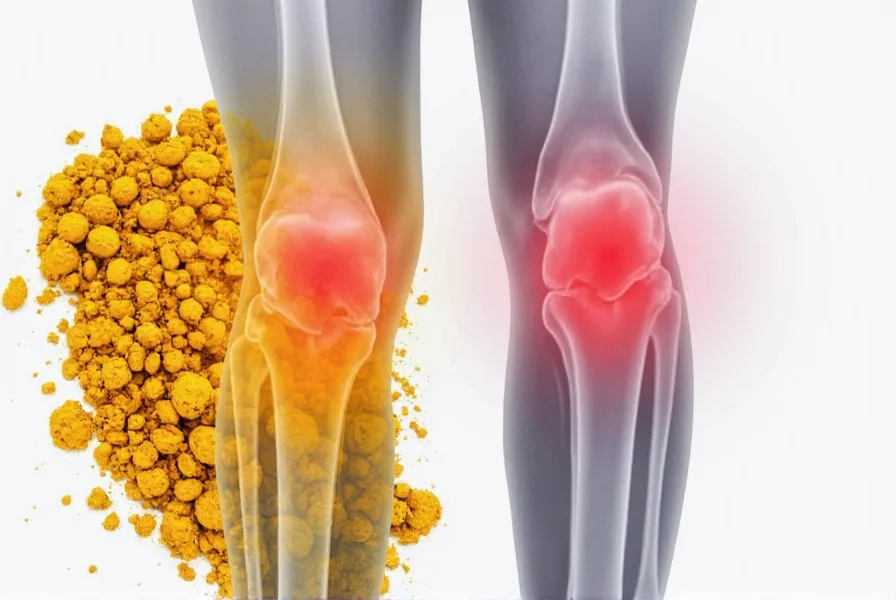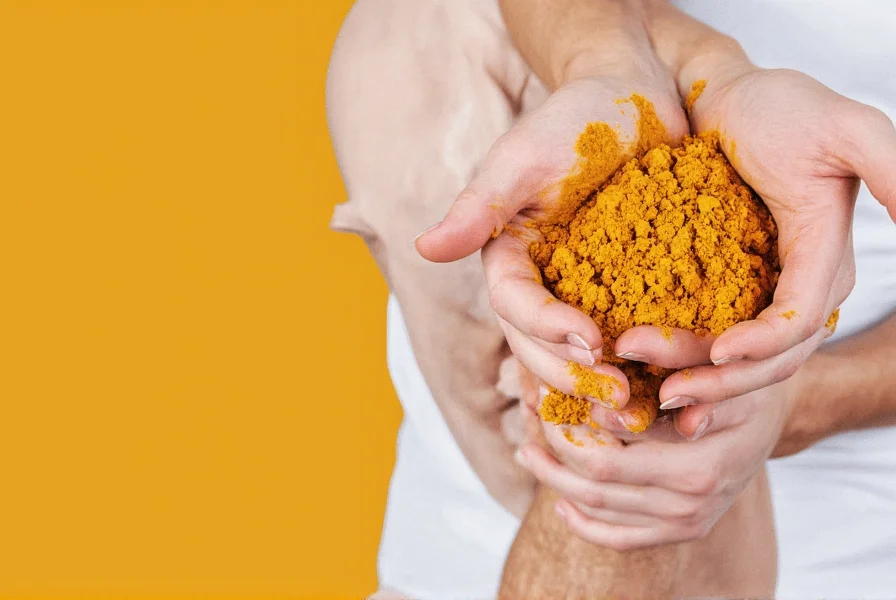Joint discomfort affects millions worldwide, driving interest in natural alternatives to conventional pain management. Turmeric and MSM have emerged as popular complementary approaches for supporting joint health. This evidence-based review examines what current research reveals about these compounds' effectiveness, mechanisms, and practical considerations for those considering them for joint support.
The Science Behind Turmeric for Joint Health
Turmeric, a vibrant yellow spice used for centuries in traditional medicine, contains curcumin as its primary active component. Curcumin works through multiple pathways that may benefit joint health:
- Inhibits inflammatory enzymes like COX-2 and LOX
- Reduces production of inflammatory cytokines
- Acts as a potent antioxidant protecting joint tissues
- May slow cartilage degradation in osteoarthritis
Multiple clinical trials support turmeric's potential for joint health. A 2016 meta-analysis published in the Journal of Medicinal Food reviewed eight clinical studies and concluded that curcumin "significantly reduced pain and improved physical function" in osteoarthritis patients compared to placebo. Another study in Phytotherapy Research found that 1,000 mg daily of a specialized curcumin formulation reduced pain scores by 46% after 12 weeks in knee osteoarthritis patients.
However, curcumin has poor bioavailability on its own. Most effective formulations combine it with piperine (from black pepper) or use specialized delivery systems to enhance absorption. When evaluating turmeric supplements for joint pain relief, look for products specifying their bioavailability enhancement method.

MSM: The Sulfur Connection for Joint Function
Methylsulfonylmethane (MSM) provides biologically active sulfur, a critical component of connective tissues including cartilage, tendons, and ligaments. Sulfur plays essential roles in:
- Collagen formation and maintenance
- Joint cartilage structure
- Reducing oxidative stress in joint tissues
- Supporting the body's natural anti-inflammatory processes
A 12-week clinical trial published in Osteoarthritis and Cartilage examined 1,125 mg of MSM three times daily in 100 osteoarthritis patients. Researchers found "statistically significant improvements" in pain and physical function compared to placebo. Another study in BMC Complementary Medicine and Therapies reported that 6,000 mg daily of MSM reduced pain by 22% and improved physical function by 25% after 12 weeks.
Unlike many pharmaceutical options for joint discomfort, MSM generally demonstrates excellent tolerability with minimal side effects at recommended doses. The most common side effects are mild gastrointestinal symptoms that typically resolve with continued use or dose adjustment.
Combining Turmeric and MSM: Potential Synergistic Effects
Many supplement formulations combine turmeric and MSM, theorizing that their complementary mechanisms might create enhanced benefits for joint health. While direct research on this specific combination remains limited, the rationale includes:
| Compound | Primary Mechanism | Potential Joint Benefit |
|---|---|---|
| Turmeric (Curcumin) | Anti-inflammatory, antioxidant | Reduces joint inflammation and pain |
| MSM | Sulfur donor, antioxidant | Supports connective tissue structure and function |
| Combined | Synergistic anti-inflammatory and structural support | Potentially greater pain relief and joint function improvement |
The theoretical synergy makes biological sense—curcumin addresses inflammation while MSM supports the structural components of joints. However, more clinical research specifically examining this combination is needed to confirm whether the combined effect exceeds what each compound provides individually.
Practical Considerations for Joint Health Support
When considering turmeric and MSM for joint health, several practical factors influence effectiveness:
Dosage Guidelines Based on Research
Research suggests these evidence-based dosages:
- Turmeric/Curcumin: 500-1,500 mg of a bioavailable curcumin formulation daily, typically divided into two doses
- MSM: 1,500-6,000 mg daily, often divided into two or three doses
Most studies showing positive effects used these ranges consistently for 8-12 weeks before significant improvements were noted. Patience is essential, as natural compounds often work more gradually than pharmaceutical interventions.
Safety Profile and Potential Interactions
Both compounds generally demonstrate good safety profiles, but important considerations include:
- Turmeric may interact with blood thinners and diabetes medications
- High doses of turmeric may cause gastrointestinal discomfort in some individuals
- MSM is generally well-tolerated, though some report mild digestive issues at higher doses
- Those with sulfur allergies should consult a healthcare provider before using MSM
Always consult with a healthcare provider before starting any new supplement regimen, especially if you have existing health conditions or take medications. This is particularly important for natural supplements for joint pain relief that may interact with conventional treatments.
Quality Matters: Selecting Effective Products
Not all supplements deliver what they promise. When choosing products for turmeric and msm joints support:
- Look for third-party testing certifications (USP, NSF, ConsumerLab)
- Verify the specific curcumin formulation and its bioavailability claims
- Check for transparent labeling of actual curcumin and MSM content
- Consider products with published clinical research supporting their specific formulation
How Turmeric and MSM Fit Into a Comprehensive Joint Health Strategy
Natural supplements like turmeric and MSM work best as part of a holistic approach to joint health. Consider combining them with:
- Moderate, joint-friendly exercise (swimming, walking, cycling)
- Anti-inflammatory dietary patterns (Mediterranean diet)
- Weight management to reduce joint stress
- Physical therapy for targeted joint strengthening
- Adequate sleep and stress management
While scientific evidence for turmeric and msm effectiveness for osteoarthritis shows promise, these compounds should complement—not replace—conventional medical care when needed. They represent valuable tools in a comprehensive approach to managing joint discomfort, particularly for those seeking natural alternatives or wanting to reduce reliance on pharmaceutical options.
Conclusion: Realistic Expectations for Joint Support
Current research suggests turmeric and MSM offer promising natural options for supporting joint health, with moderate evidence supporting their use for reducing pain and improving function in osteoarthritis. While not miracle cures, they represent valuable components of a comprehensive joint health strategy when used appropriately.
The most successful outcomes come from consistent use of quality products at appropriate dosages, combined with other healthy lifestyle practices. As research continues to evolve, we may gain clearer understanding of optimal formulations, dosages, and which individuals are most likely to benefit from these natural compounds for joint pain relief.
Frequently Asked Questions
How long does it take for turmeric and MSM to work for joint pain?
Most clinical studies show noticeable improvements after 8-12 weeks of consistent daily use. Some people report subtle changes within 2-4 weeks, but maximum benefits typically require 2-3 months of regular supplementation. Patience is important as natural compounds often work more gradually than pharmaceutical pain relievers.
Can I take turmeric and MSM together with other joint supplements?
Yes, turmeric and MSM are commonly combined with other joint support supplements like glucosamine, chondroitin, and omega-3 fatty acids. These combinations often work synergistically. However, always check for potential interactions with any medications you're taking and consult your healthcare provider before combining multiple supplements, especially if you have underlying health conditions.
Are there any side effects of taking turmeric and MSM for joints?
Both compounds are generally well-tolerated. Turmeric may cause mild digestive issues in some people, especially at higher doses, and may interact with blood thinners. MSM is typically very well-tolerated, though some report mild gastrointestinal symptoms. Neither compound typically causes serious side effects at recommended dosages, but individual responses vary.
What's the best time of day to take turmeric and MSM for joint health?
For optimal absorption and consistent blood levels, divide your daily dosage between morning and evening, preferably with meals. Turmeric with black pepper (piperine) should be taken with food to enhance absorption, while MSM can be taken with or without food. Consistency in timing helps maintain steady levels of these compounds in your system.











 浙公网安备
33010002000092号
浙公网安备
33010002000092号 浙B2-20120091-4
浙B2-20120091-4